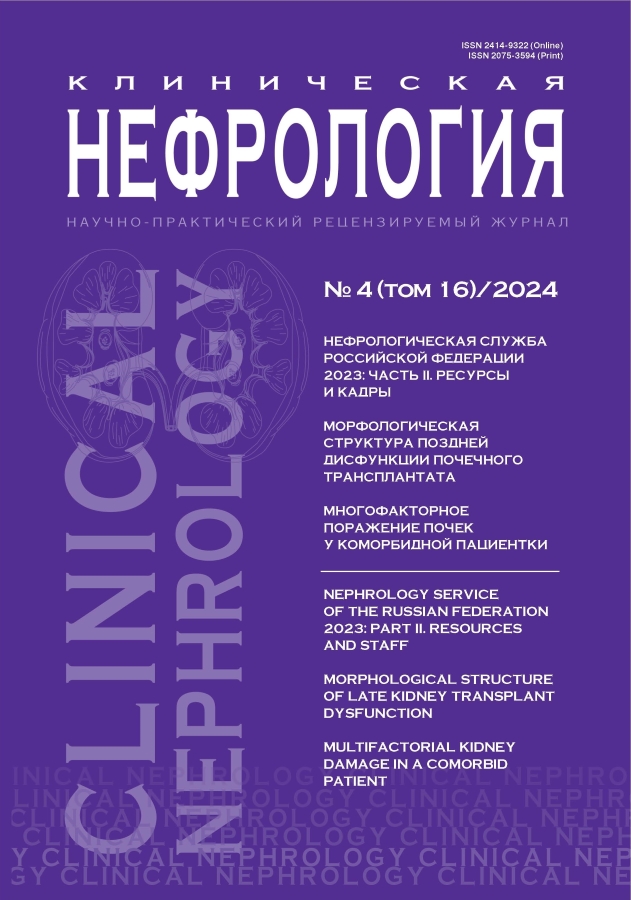Morphological structure of late kidney transplant dysfunction
- Authors: Rapetskaya N.V.1, Komissarov K.S.1,2, Dmitrieva M.V.2, Liatkoyskaya T.A.2, Kalachyk A.V.1
-
Affiliations:
- Minsk Scientific and Practical Center for Surgery, Transplantology and Hematology
- Belarusian State Medical University
- Issue: Vol 16, No 4 (2024)
- Pages: 12-16
- Section: Original Articles
- URL: https://journals.eco-vector.com/2075-3594/article/view/679902
- DOI: https://doi.org/10.18565/nephrology.2024.4.12-16
- ID: 679902
Cite item
Abstract
Objective: to analyze the causes of late kidney allograft dysfunction according to results of kidney transplant histopathological examination performed from 2013 to 2022.
Material and methods. Analysis of late kidney allograft dysfunction causes was carried out according to 431 reports of kidney transplant biopsies performed in Minsk Scientific and Practical Center for Surgery, Transplantology and Hematology, Republic of Belarus.
Results. The main causes of kidney transplant dysfunction in late posttransplant period were antibody-mediated rejection – 26.7%, recurrent or de novo glomerular diseases – 22.7%, chronic allograft nephropathy – 16%.
Full Text
About the authors
Nadzeya V. Rapetskaya
Minsk Scientific and Practical Center for Surgery, Transplantology and Hematology
Author for correspondence.
Email: n.rapetskaja@gmail.com
ORCID iD: 0009-0005-4560-1162
Nephrologist, Department of Transplant Nephrology
Belarus, Minsk, Semashko str., 8Kirill S. Komissarov
Minsk Scientific and Practical Center for Surgery, Transplantology and Hematology; Belarusian State Medical University
Email: kirill_ka@tut.by
ORCID iD: 0000-0002-2648-0642
PhD (Med. Sci), Associate Professor, Head of the Department of Nephrology, Renal Replacement Therapy and Kidney Transplantation
Belarus, Minsk; Minsk, Semashko str., 8Margarita V. Dmitrieva
Belarusian State Medical University
Email: mvdmitieva@inbox.ru
ORCID iD: 0000-0002-2958-9424
PhD (Med. Sci), Associate Professor, Department of Pathological Anatomy and Forensic Medicine
Belarus, Minsk, Kizhevatova str., 60Tatiana A. Liatkoyskaya
Belarusian State Medical University
Email: taletkovskaya@mail.ru
ORCID iD: 0000-0002-9381-2985
PhD (Med. Sci), Associate Professor, Head of the Department of Pathological Anatomy and Forensic Medicine
Belarus, Minsk, Kizhevatova str., 60Aleh V. Kalachyk
Minsk Scientific and Practical Center for Surgery, Transplantology and Hematology
Email: oleg_kalachik@hotmaill.com
ORCID iD: 0009-0002-6954-675X
DSc (Med. Sci), Professor, Deputy Director for Medical Affairs
Belarus, Minsk, Semashko str., 8References
- ERA Registry: ERA Registry Annual Report 2022. Amsterdam UMC, location AMC, Department of Medical Informatics, Amsterdam, the Netherlands, 2024. https://www.era-online.org/research-education/era-registry/annual-reports.
- Coemans M., et al. Analyses of the short-and long-term graft survival after kidney transplantation in Europe between 1986 and 2015. Kidney Int. 2018;94(5):964–73. doi: 10.1016/j.kint.2018.05.018.
- Keith D.S., Vranic G., Nishio-Lucar A. Graft function and intermediate-term outcomes of kidney transplants improved in the last decade: analysis of the United States kidney transplant database. Transplant. Direct. 2017;3(6):e166. doi: 10.1097/TXD.0000000000000654.
- Solez K., et al. Banff ’05 Meeting Report: Differential Diagnosis of Chronic Allograft Injury and Elimination of Chronic Allograft Nephropathy (’CAN’). Am. J. Transplant. 2007;7(3):518–26. doi: 10.1111/j.1600-6143.2006.01688.x.
- Mubarak M., Raza A., Rashid R., Shakeel S. Evolution of human kidney allograft pathology diagnostics through 30 years of the Banff classification process. World J. Transplant. 2023;13(5):221–38. doi: 10.5500/wjt.v13.i5.221.
- Tejido Sánchez A., et al. Tratamiento de las complicaciones tardías del trasplante renal [Late kidney transplant complications treatment.]. Arch. Esp. Urol. 2021;74(10):1040–9.
- Agarwal G., Diskin C.D., Williams T.A., Kumar V. Late Antibody-Mediated Rejection in Kidney Transplant Recipients: Outcomes after Intravenous Immunoglobulin Therapy. Clin. Transpl. 2016;32:111–8.
- Racusen L.C., Solez K., et al. The Banff 97 working classification of renal allograft pathology. Kidney Int. 1999;55(2):713–23. doi: 10.1046/j.1523-1755.1999.00299.x.
- Haas M. The Revised (2013) Banff Classification for Antibody-Mediated Rejection of Renal Allografts: Update, Difficulties, and Future Considerations. Am. J. Transplant. 2016;16(5):1352–7. doi: 10.1111/ajt.13661.
- Loupy A., Haas M., et al. The Banff 2015 Kidney Meeting Report: Current Challenges in Rejection Classification and Prospects for Adopting Molecular Pathology. Am. J. Transplant. 2017;17(1):28–41. doi: 10.1111/ajt.14107.
- Haas M., Loupy A., et al. The Banff 2017 Kidney Meeting Report: Revised diagnostic criteria for chronic active T cell-mediated rejection, antibody-mediated rejection, and prospects for integrative endpoints for next-generation clinical trials. Am. J. Transplant. 2018;18(2):293–307. doi: 10.1111/ajt.14625.
- Loupy A., et al. The Banff 2019 Kidney Meeting Report (I): Updates on and clarification of criteria for T cell -And antibody-mediated rejection. Am. J. Transplant. 2020;20:2318–31. doi: 10.1111/ajt.15898.
- Einecke G., et al. Factors associated with kidney graft survival in pure antibody-mediated rejection at the time of indication biopsy: Importance of parenchymal injury but not disease activity. Am. J. Transplant. 2021;21(4):1391–401. doi: 10.1111/ajt.16161.
- Yagisawa T.M.M., at al. Trends of kidney transplantation in Japan in 2018: data from the kidney transplant registry. Ren. Replace. Ther. 2019;5(3). doi: 10.1186/s41100-019-0199-6.
- Nickerson P.W. What have we learned about how to prevent and treat antibody-mediated rejection in kidney transplantation? Am. J. Transplant. 2020;20(4):12–22. doi: 10.1111/ajt.15859.
- Schinstock C.A., et al. The Value of Protocol Biopsies to Identify Patients With De Novo Donor-Specific Antibody at High Risk for Allograft Loss. Am. J. Transplant. 2017;17(6):1574–84. doi: 10.1111/ajt.14161.
- Sellarés J., et al. Understanding the causes of kidney transplant failure: the dominant role of antibody-mediated rejection and nonadherence. Am. J. Transplant. 2012;12(2):388–99. doi: 10.1111/j.1600-6143.2011.03840.x.
- Berger M., et al. Chronic Active Antibody-mediated Rejection: Opportunity to Determine the Role of Interleukin-6 Blockade. Transplantation. 2024;108(5):1109–14. doi: 10.1097/TP.0000000000004822.
- Комиссаров К.С., Комиссаров К.С., Дмитриева М.В., Летковская Т.А. Гистопатологический спектр болезней почек по данным нефробиопсий, выполненных в Минске, Республика Беларусь. Клин. нефрология. 2020;12(2):26–30. [Komissarov K.S., Komissarov K.S., Dmitrieva M.V., Letkovskaja T.A. Histopatological spectrum of kidney diseases according to renal biopsies performed in Minsk, Republic of Belarus. Clin. Nephrol. 2020;12(2):26–30 (In Russ.)]. doi: 10.18565/nephrology.2020.2.26-00.
- Allen P.J., et al. Recurrent glomerulonephritis after kidney transplantation: risk factors and allograft outcomes. Kidney Int. 2017;92(2):461–9. doi: 10.1016/j.kint.2017.03.015.
- Betjes M.G.H., et al. Causes of Kidney Graft Failure in a Cohort of Recipients with a Very Long-Time Follow-Up After Transplantation. Front. Med. 2022;9:842419. doi: 10.3389/fmed.2022.842419.
- Burton H., et al. Causes of renal allograft failure in the UK: trends in UK Renal Registry and National Health Service Blood and Transplant data from 2000 to 2013. Nephrol. Dial. Transplant. 2019;34(2):355–64. doi: 10.1093/ndt/gfy168.
- Uffing A., et al. Recurrence of IgA Nephropathy after Kidney Transplantation in Adults. Clin. J. Am. Soc. Nephrol. 2021;16(8):1247–55. doi: 10.2215/CJN.00910121.
- Rapetskaya N., Komissarov K., Kalachyk A. IgA-nephropathy in kidney transplant recipients: one center experience. Kidney Int. Rep. 2021;6(4):333. doi: 10.1016/j.ekir.2021.03.794.
Supplementary files












